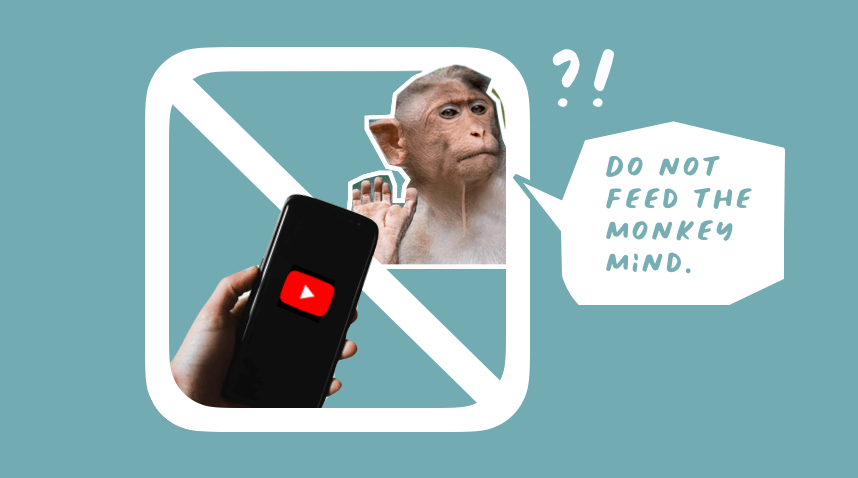“Just one last one.”
I transform into the worst liar whenever I fall into the rabbit hole of YouTube.
If you are like me, a 30-minute video break at night usually stretches to 3-4 hours. That’s enough time to make a round trip between Singapore to Bangkok! Despite your logical mind telling you to stop, the last video usually ends when you fell asleep or when you realised it’s 3 hours before sunrise. You wake up looking like Jia Jia or Kai Kai, and feeling like one too. You notice the quality of your work is compromised cause of the late night sleep. Regretting, you promise yourself to not do it again.
A brand-new day! You are determined to change your life for good, start watching videos on how to be productive… and you see the recommended videos on the sidebar… well, we know how this story ends. “Just one last one” turn into a pack of lies we tell ourselves.
The binge-watching cycle repeats itself, and we wake up feeling guilty and hating ourselves even more.
In another post, I write about how we can be unproductive without feeling guilty. But here, let us unpack the reasons why we are unproductive in order to end the brainless nonsense once and for all.
3 reasons why you are unproductive:
1. Your brain is running low on energy
Like our smartphone, our smart brain runs low on ‘battery’ after a long day of usage. After a long and exhausting day, the control centre of our brain (a.k.a. the prefrontal cortex) is worn out by decision fatigue. This is the part that makes wise executive decisions for us and keeps impulses that don’t serve us at bay. But because this poor CEO (of our brain) is burnt out, the monkey mind takes over and all hell breaks loose.
Just one video to wrap the day? Good Luck! If you have ever carried a plastic bag during your hike up the Bukit Timah hill, you would know what I mean. “Oh look another goodie!” This is how the monkey mind swings from video to video, grabbing onto anything that gratifies it instantly. It tricks us to think that the next shiny object is going to make us feel good. After countless times chasing after monkeys (yes, I think there is more than one residing in my brain), I have learnt that I cannot leave my sluggish evening-brain to its own devices.
The following help me to outsmart the mischievous mind, which you can try too:
(a) Stay clear of monkey food during monkey hours.
If I can’t trust my tired brain to stop, let me not begin. Planning ahead, creating signposts and boundaries are helpful. I know my willpower is usually depleted by 9pm. So that is the time to avoid the social media mouse trap. To do so, I put my phone and computer away. If this is not possible, consider purchasing rescue time to lock specific apps after a certain timing and track your time. Beyond that, hitting the unsubscribe and delete button for Netflix is the best decision I’ve made in 2019.
(b) Meditate to gain back executive control.
If I do have to get work done by surfing the net during monkey hours, meditation helps to refill the energy (a.k.a. blood flow) to the prefrontal cortex. This helps to tame the monkey mind so I can get work done. I recommend this 30-day course available Insight Timer: Unlock your wise and mindful brain.
2. You wait to be motivated rather than create it
On good days, we can feel the fire in our bellies, ready to conquer the day and get things done. On bad days, especially rainy ones, we just want to laze around. We may wait to feel motivated to be productive. But how often do we wake up feeling great and not feel tempted to hit the snooze button? In the book, the motivation myth, Jeff Haden highlighted that motivation is not the spark behind our actions. Rather, motivation is the result of our actions. This wasn’t a new concept to the Buddha. He even gave a full discourse about the grounds of laziness and the arousal of energy. It seems that a lazy person would always be finding excuses to avoid doing what is beneficial to himself. The other person with the same circumstances would carry a different mindset. He makes effort to attain what is yet attained to arouse energy.
(a) Just do it.
Nike is right. Regardless of our moods and the weather, if we have set a task for ourselves to complete, just do it. I find that the very act of starting something creates the momentum for me to continue — a beneficial momentum that is the opposite of the monkey business mentioned above.
(b) Create conditions to feel good.
When we feel good, we feel much ready to meet a goal. And when we meet our goals, we feel good. And boom! An infinity loop. The opposite is true. So, create an entertainment-free routine that makes you feel good. This can include meditation, exercise, reflecting on what to be grateful for, having a nice meal, listening to joyful music; activities that naturally boost the dopamine levels of our brain.
3. You set goals instead of systems
Goals are something that motivate us to get our butts moving aren’t they? Not entirely. The problem with goals is that they are temporary. If we don’t change our faulty habits, once goals are achieved, with the lack of new ones, our life will revert back to a sluggish one. For example, once I finish writing this article, what do I do? Without a ’system’ in place to build my habits, I might fall into the late-night-video-binging predicament again.
Also, if setting goals is all it takes for us to achieve it, we would have been productive isn’t it? In the book, Atomic habits, James Clear put forth a contrarian approach— “We think we need to change our results, but the results are not the problem. What we really need to change are the systems that cause those results.” Both winners and losers have the same goal. What leads them to different outcomes is the system they implement and the actions they take.
Here’s what I do:
(a) Change tactic and have fun
Einstein is commonly attributed for the wise quote “Insanity is doing the same thing over and over again and expecting different results”. Experiment with a different input, monitor the results, refine, and optimise. Failing over and over can be frustrating. Adopting the sense of curiosity in the process has made this self-improvement journey very enjoyable.
(b) Analyse every habit
A single habit such as sitting on the sofa after a shower can trigger the next habit of surfing the web. Listing down the habits gave me visibility of the full chain of events (cause and effect) in order to break it. I highly recommend you to read the book Atomic habits, block off a weekend to complete the in-book exercises.
Above all, staying truthful to oneself to follow all the beneficial actions might not be easy, especially when the mental energy is drained. Hence, to top it up, setting an accountability system has been very effective for me. Since last December, I have been committing to meditating at least 45 minutes a day or else I have to pay by doing 50 push ups for each day I don’t. So far, I have only paid a handful of penalties. And since then, I’ve been meditating daily and more than before! So, if starting seems like an uphill climb, find a buddy to keep you going.
Conclusion:
Being productive and effective is a lifelong journey. Of course, the list of reasons in this article isn’t exhaustive. Everyone is different and may you find what works for you.
Fun quiz: How many animals can you spot in this write up?
Want to learn how to meditate to tame that monkey mind of yours?
Spiralling from questioning yourself ‘why do I feel so unproductive’ to questions like ‘how to get motivated’ and into the deep question like ‘what is life’s purpose’? It’s time to take a breather and pause, focus on your present and resume with a clearer mind.
If you’re new to meditation, we’ve prepared an info pack called ‘meditation 101‘ that condensed the necessary information about meditation and buddhist meditation in short 15-25 minutes read. We’ve also included sources that you can reach out to as guidance for your meditation practice.


